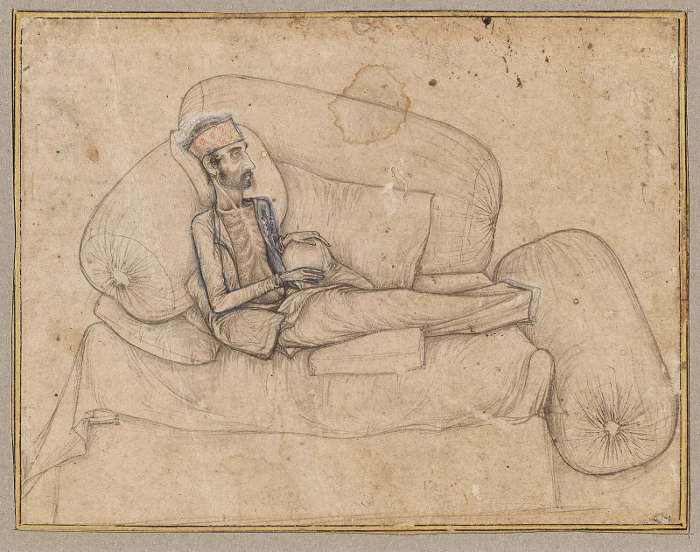FWP:
The quizzical inshaa))iyah ending of line two opens up many moods-- grief, reproach, irony, a genuine question. As usual, it's left for us to decide-- and decide afresh as many times as we recite the verse.
But the main pleasure of the verse is contained in line one, in the idea that the lover's eyes closed just as he was in the act of opening them [mu;Nd ga))ii;N kholte hii kholte aa;Nkhe;N]. C. M. Naim has pointed out (July 2005) how different kholte hii kholte , with its sense of purpose and volition, is from khulte hii khulte , which would merely have referred to the eyes as becoming open, with no further information. And it's also contrasted with mu;Nd ga))ii;N , which simply reports that the eyes closed somehow or other, for reasons unspecified-- perhaps involuntarily, perhaps helplessly-- rather than being closed by the will or action of the speaker.
Note for grammar fans: What this distinction represents is of course the difference between the transitive kholnaa , 'to open', and the intransitive khulnaa , 'to become open' (with no agent involved). Similarly, the intransitive mu;Ndnaa , 'to become closed' (with no agent involved), carries an implicit contrast with the transitive muu;Ndnaa , 'to close'. Exactly the same contrast is created in {72,3}. Here is *Naim's own account* of transitives and intransitives.
Ghalib was so fond of that phrase kholte hii kholte that he used it identically (though perhaps less effectively) in the first line of the very similar {72,3} as well. For more on such re-using of phrases and lines, see {49,1}. For more on the beloved's visits to the lover, see {106,2}.
The dying lover's eyes are apparently closed in fatigue or despair, since it's only the news of the beloved's arrival that causes him to begin to open them. And then, just as they are coming open, they close again. Nothing in the verse itself tells us that this second closing is a sign of death--only the power of implication makes us aware of the melancholy and ironic truth. This verse belongs to the 'dead lover speaks' set; for others, see {57,1}.
Possibly the intense emotion generated by awareness of the beloved's presence has been too much for the lover's much-abused heart, and has itself brought on his death. Thus the beloved's life-giving presence, which might almost have revived the lover (or perhaps had actually begun to do so, as his eyes fluttered open), has been death-giving. Compare {9,7}, in which the lover is killed by the stress of Jesus's breathing on him to restore him to life.
Compare Mir's lighter, wittier take on the too-late show of kindness: M{1806,1}. (There's also the more similar but less impressive M{2,3}.)

Nazm:
The eyes' closing is an implication of death. And in this ground there is only this one verse, and it too should have been removed. Later on there's a verse with this very same theme: {72,3}. (48)
== Nazm page 48